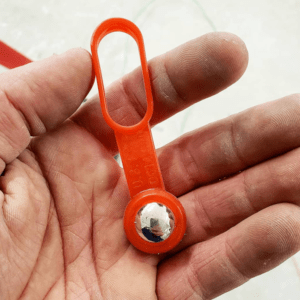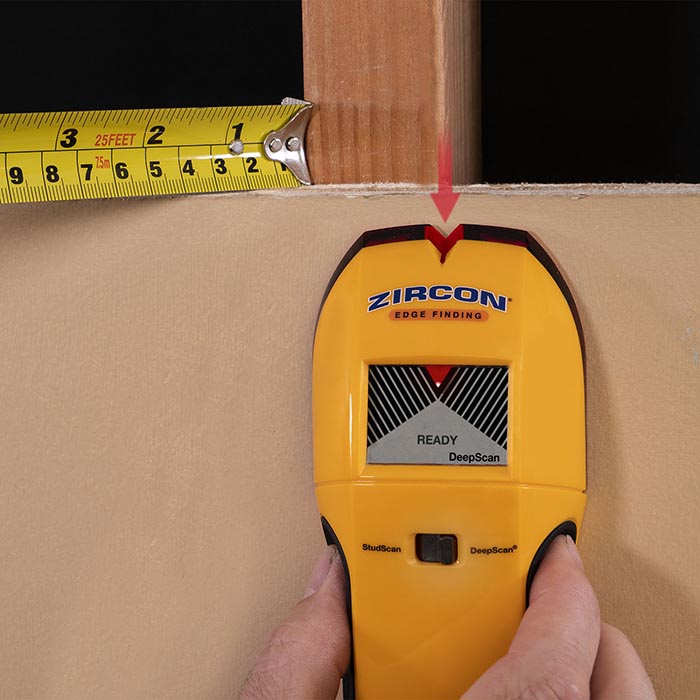The 7 Best Stud Finder for Electricians in 2024
Stud finders are invaluable tools for electricians and DIY homeowners alike. They are crucial for mounting electrical fixtures, shelves, or cabinets. Whether you’re installing new outlets, running wires, or hanging up fixtures, a stud finder helps you find support behind the drywall, preventing accidental damage and ensuring a secure installation. With their ability to identify studs quickly, stud finders streamline projects.
How We Chose the Best Stud Finder
When comparing stud finders, electricians compare the pros and cons of electronic versus magnetic models. Electronic stud finders use sensors to detect density changes in the wall, providing precise stud locations. They’re great for pinpointing studs and can often detect other hidden objects like electrical wiring. They may struggle with thick or uneven walls and need batteries, which can be a hassle to replace. Battery-free magnetic stud finders locate metal fasteners or nails within the studs, making them reliable. They’re excellent for finding studs in thicker walls and are more straightforward. However, they may not detect studs reliably in walls without metal fasteners, and their detection range can be limited. The choice between electronic and magnetic stud finders depends on the specific project and personal preferences.
We’re on a mission to find the top 7 stud finders perfect for electricians and DIY enthusiasts alike. Whether you’re a pro searching for precision or a homeowner ready to tackle projects, we’ve got you covered. From high-tech electronic finders to straightforward magnetic ones, we’ll explore a variety of options to help you pick the perfect tool for your needs. Join us as we dive into the world of stud finders and discover the best ones to make your projects a breeze!
Rack-A-Tiers Stud Ball Magnetic Stud Finder
@rackatierstools Get the studball – simple stud finder, link in bio #rackatierstools #studfinder #studball #electrician #electriciansoftiktok #carpenter
 For electricians seeking a no-nonsense stud finder for residential projects, the Rack-A-Tiers Stud Ball stands out for its ease of use and reliability. Here’s why it should be in your toolbox.
For electricians seeking a no-nonsense stud finder for residential projects, the Rack-A-Tiers Stud Ball stands out for its ease of use and reliability. Here’s why it should be in your toolbox.
Pros:
- Fast and Efficient: Unlike some stud finders with too many modes and displays, the Stud Ball relies on a powerful magnet. Slide it along the wall and its magnetic pull sticks to screws, nails, and metal studs behind common building materials, helping you quickly find potential spots for outlets, switches, and electrical boxes.
- Cost-Effective: The Stud Ball’s budget-friendly price makes it a low-risk investment for basic electrical work on residential projects.
- Built to Last: The strong magnet and design ensure it can withstand the bumps and scrapes of everyday use on the job site.
Note: The Stud Ball relies on a magnet so it might not provide the exact center point of a stud compared to some electronic stud finders. However, for most electrical work requiring placing outlets, switches, and boxes, that isn’t an issue.
The Zircon StudSensor A100
 The Zircon StudSensor A100 Stud Finder offers a good balance of affordability and features, making it a great choice for DIYers and electricians.
The Zircon StudSensor A100 Stud Finder offers a good balance of affordability and features, making it a great choice for DIYers and electricians.
Pros:
- User-Friendly: Clear markings, an audible alert, and a simple interface make it easy for beginners and experienced users to operate.
- Multi-Material Detection: StudScan mode finds wood or metal studs up to ¾ inches deep in walls for residential electrical work and hanging projects.
Cons:
- Limited Features: While it finds studs and live wires, it lacks advanced features like stud width indicators or deeper live wire detection found in high-end models.
- Accuracy Concerns: Some users report occasional inconsistencies, particularly near stud edges. Electricians may find this less than ideal for precise wire routing
See the Zircon StudSensor A100
Walabot DIY 2
 The Walabot DIY 2 is a unique stud finder that uses advanced imaging technology to “see” through walls. This makes it a compelling choice for DIYers and electricians but with some important considerations.
The Walabot DIY 2 is a unique stud finder that uses advanced imaging technology to “see” through walls. This makes it a compelling choice for DIYers and electricians but with some important considerations.
Pros:
- Advanced Wall Imaging: Unlike traditional stud finders, the Walabot DIY 2 displays an image on your smartphone screen. It reveals the location of studs, pipes, and even wires up to 4 inches deep in walls.
- Multi-Material Detection: This can be helpful for both DIYers and electricians, as it aids in locating not only studs for hanging shelves or electrical boxes, but also avoiding hidden pipes during drilling.
Cons:
- Price: The Walabot DIY 2 costs more than traditional stud finders.
- Learning Curve: Using the imaging features and interpreting the app display requires more learning compared to simple stud finders.
Overall, the Walabot DIY 2 is a powerful tool and valuable asset for DIYers and electricians who want to see what’s behind their walls. However, keep in mind its higher price point, learning curve, and potential for user error.
Franklin Sensors ProSensor M210 Stud Finder
 The Franklin ProSensor M210 Stud Finder is a popular stud finder for electricians, offering a good balance of features and ease of use.
The Franklin ProSensor M210 Stud Finder is a popular stud finder for electricians, offering a good balance of features and ease of use.
Pros:
- Simple Operation: One-button design and clear display make it user-friendly
- Suitable for residential electrical work where finding studs for outlets and switches is crucial.
Cons:
- Cost: The M210 costs more than some basic stud finders.
- Electricians: Not top-of-the-line for commercial jobs demanding extensive features and durability.
Check Out the Franklin Sensors ProSensor M210
Milwaukee Sub-Scanner M12
 The Milwaukee Sub-Scanner M12 is a heavy-duty stud finder designed for professional contractors. Its powerful features can also be beneficial for experienced DIYers and homeowners.
The Milwaukee Sub-Scanner M12 is a heavy-duty stud finder designed for professional contractors. Its powerful features can also be beneficial for experienced DIYers and homeowners.
Pros:
- Advanced Features: Goes beyond basic stud finding. It can detect rebar in concrete up to 6 inches deep, a feature useful for construction or major renovations.
- Durability: Built for the jobsite with a pistol grip design and rugged over-molding.
Cons:
- Price: Compared to basic stud finders, the Sub-Scanner M12 is a significant investment.
- Bulkier Design: Not as compact as some stud finders, so it might be less suitable for tight spaces.
Overall, the Milwaukee Sub-Scanner M12 is a versatile stud finder ideal for professional electricians. The higher price, bulkier design, and added battery requirement make it less practical for casual DIYers or those on a tight budget.
See the Milwaukee Sub-Scanner M12
Mecurate Stud Finder
 The Mecurate Stud Finder Wall Scanner Sensor offers a balance of affordability and features, making it suitable for DIYers, homeowners, and even some electricians for basic tasks.
The Mecurate Stud Finder Wall Scanner Sensor offers a balance of affordability and features, making it suitable for DIYers, homeowners, and even some electricians for basic tasks.
Pros:
- Easy to Use: One-button operation, clear LED display with icons, and audio alerts.
- Budget-Friendly: The Mecurate Stud Finder is a cost-effective choice compared to other models.
Cons:
- Accuracy Concerns: Some users report occasional inconsistencies, particularly in stud edge detection. This may require extra caution when marking drilling spots.
Overall, the Mecurate Stud Finder Wall Scanner Sensor is a good choice for DIYers and homeowners tackling various projects where finding studs is important. Electricians working on complex jobs or requiring top accuracy may need a more advanced stud finder.
Check our the Mecurate Stud Finder
CRAFTSMAN Stud Finder, 3/4-Inch Depth (CMHT77633)
 The CRAFTSMAN Stud Finder, 3/4-Inch Depth (CMHT77633) is an affordable stud finder suitable for basic home projects.
The CRAFTSMAN Stud Finder, 3/4-Inch Depth (CMHT77633) is an affordable stud finder suitable for basic home projects.
Pros:
- Easy to use: This stud finder is straightforward – perfect for occasional DIY projects.
- Works through common wall coverings: It can detect studs behind wallpaper and fabric.
Cons:
- Less precise: While it can find studs, some users report inconsistent readings, especially for stud edges.
Overall, the CRAFTSMAN Stud Finder is a good choice for basic stud finding and simple DIY tasks around the house.
View the CRAFTSMAN Stud Finder
The Winner: The Best Stud Finder for Residential Electricians
 For electricians prioritizing a simple, reliable, and affordable tool for basic stud-finding tasks, the Rack-A-Tiers Stud Ball is a winner. Its magnetic functionality ensures quick and easy detection of metal studs behind walls, perfect for locating spots for outlets, switches, and electrical boxes in residential projects. The Stud Ball’s compact size and durable build make it easy to carry around on your job belt, ensuring you have this essential tool at your fingertips. With its low price, there’s no reason not to add the Rack-A-Tiers Stud Ball to your electrical toolbox.
For electricians prioritizing a simple, reliable, and affordable tool for basic stud-finding tasks, the Rack-A-Tiers Stud Ball is a winner. Its magnetic functionality ensures quick and easy detection of metal studs behind walls, perfect for locating spots for outlets, switches, and electrical boxes in residential projects. The Stud Ball’s compact size and durable build make it easy to carry around on your job belt, ensuring you have this essential tool at your fingertips. With its low price, there’s no reason not to add the Rack-A-Tiers Stud Ball to your electrical toolbox.